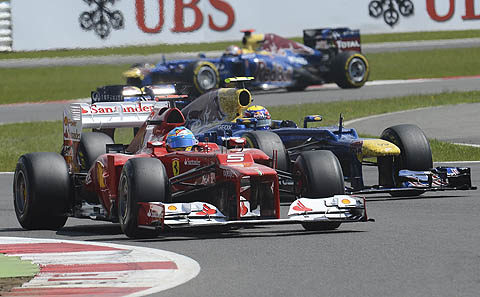


28/07/2012
NEWS STORY
 |
The commercial future of Formula One is a little uncertain at the moment as the world is waiting to see whether it goes ahead with a planned flotation on the Singapore stock exchange by the end of the year. This was expected to take place last month but instead was delayed until later in the year due to the turmoil on the world's financial markets. It remains to be seen whether this will come off as the markets are still volatile. However, a report in today's Telegraph, by Pitpass' business editor Christian Sylt, reveals that the finances of F1 itself have never been rosier.
The report is based on the accounts for the year-ending 31 December 2011 of key F1 holding company Delta 2. Luxembourg-based Delta 2 gets fees from televising F1 as well as hosting the races and last year its revenue accelerated 6% to a record £780.7m ($1.222bn). The money received by Delta 2 makes up 80% of F1's total revenue. The companies responsible for F1's two other main business areas, trackside advertising and corporate hospitality, are based in Jersey so do not file publicly available accounts. They are understood to generate a combined £191.7m ($300m) taking F1's total revenue to £972.4m ($1.522bn) last year.
Although the Bahrain Grand Prix did not take place in 2011, the debut of the Indian Grand Prix made up for this and the rise in Delta 2's revenue was driven by escalator clauses in F1's contracts. This was offset by operating costs rising 15% to £115m ($180m) as F1 upgraded its cameras to broadcast in high definition for the first time. As the increase in revenue was greater than the rise in costs, Delta 2's profits were also up meaning that F1 managed to buck the economic downturn.
The fee for hosting a Grand Prix is £17.3m ($27m) on average but this increases by around 10% annually. The accounts state that "underpinning the performance were contractual uplifts in TV and race promotion contracts, good growth in computer games' royalties, and strong results from lower margin freight and travel activities."
F1's single biggest cost is payment of 50% of its underlying profits to the top 10 teams as prize money. This increased in line with the boost in revenue and the teams got an additional £24.9m ($39m) last year taking their annual haul to £445.9m ($698m). As F1's revenues have accelerated, the prize money has increased nearly three-fold over the past five years.
The prize money wasn't the only cost which increased last year and the accounts explain that "operating expenses (excluding team payments) rose by £14.7m ($23m) to £115m during the year, driven by costs incurred in servicing higher freight, and travel sales, and due to the increasing scope of Formula One Management limited's race-based technical activities. Developments saw FOM upgrade its television production capabilities to broadcast the events of the 2011 championship in high definition for the first time."
Delta 2 had an operating profit of £69.3m ($108.5m) and then paid £583.3m ($913m) in non-cash interest on £2bn ($3.1bn) of inter-company loans which are part of a complex but perfectly legitimate tax avoidance scheme. As Sylt revealed in May this scheme sees F1 paying around 4% tax despite 14 of the 30 companies in the group being located in the UK where the main rate of corporation tax is 25%. It pushed Delta 2 into a net loss of £467m ($731m) but excluding the interest on inter-company loans, amongst other things, left the company with profits of £263.2m ($412m), up 10% on the previous year.
During 2011 F1 paid off £102m ($159.6m) of the bank loans which were used by private equity firm CVC to buy the sport in 2006. A total of £1bn ($1.6bn) was outstanding at the end of 2011 and CVC refinanced it with a £1.4bn ($2.2bn) loan earlier this year. After making the payments Delta 2 was left with a cash surplus of £120.3m ($188.3m) taking its total in the bank to £324.4m ($507.8m). It will need it.
As Sylt also revealed in May, a bonus of £115m is due to be paid to the teams to give them an incentive to sign the Concorde Agreement, the contract which commits them to F1. It expires at the end of this year and has not yet been extended. The accounts say F1's management is confident that "terms will be agreed for all teams to continue to participate beyond 2012." Time will tell how soon this happens.